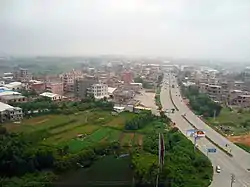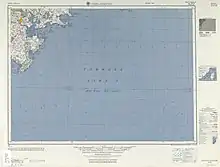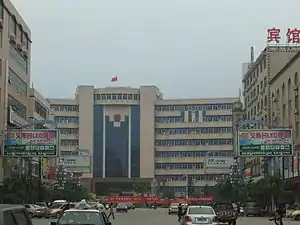Jinjiang, Fujian
Jinjiang (simplified Chinese: 晋江; traditional Chinese: 晉江; pinyin: Jìnjiāng; Pe̍h-ōe-jī: Chìn-kang) is a county-level city of Quanzhou City, Fujian Province, China. It is located in the southeastern part of the province (Minnan), on the right or south bank of the Jin River, across from Quanzhou's urban district of Fengze and Licheng. Jinjiang also borders the Taiwan Strait of the East China Sea to the south, and Quanzhou's other county-cities of Shishi and Nan'an to the east and west, respectively. It has an area of 721.7 square kilometres (278.6 sq mi) and a population of 1,986,447 as of 2010.[1]
Jinjiang
晋江市 Tsinkiang | |
|---|---|
 Jinjiang | |
 Jinjiang in Quanzhou | |
 Jinjiang Location in Fujian | |
| Coordinates (Jinjiang municipal government): 24°46′54″N 118°33′06″E | |
| Country | People's Republic of China |
| Province | Fujian |
| Prefecture-level city | Quanzhou |
| City seat | Luoshan Subdistrict (罗山街道) |
| Area | |
| • Total | 721.7 km2 (278.6 sq mi) |
| Population (2010) | |
| • Total | 1,986,447 |
| • Density | 2,800/km2 (7,100/sq mi) |
| Time zone | UTC+8 (China Standard) |
| Postal code | 362200 |
| Area code | 0595 |
| Website | www.JinJiang.gov.cn |
Jinjiang has the only extant Manichean temple in China (Cao'an temple) and is near the eastern end of the world's longest estimated straight-line (great circle) path over land, at 11,241 km (6,985 mi), ending near Sagres, Portugal.[2]
Administrative divisions

Jinjiang has six subdistricts and 13 towns:
- Subdistricts
- Towns
- Anhai (安海镇)
- Chendai (陈埭镇)
- Chidian (池店镇)
- Cizao (磁灶镇)
- Dongshi (东石镇)
- Jinjing (金井镇)
- Longhu (龙湖镇)
- Neikeng (内坑镇)
- Shenhu (深沪镇)
- Xibin (西滨镇)
- Yinglin (英林镇)
- Yonghe (永和镇)
- Zimao (紫帽镇)
 Anhai Town Government
Anhai Town Government Jinjiang's Lüzhou (Green Island) Park, with a monument bearing the inscription "诚信、谦恭、团结、拼搏" (Integrity, humility, unity, hard work)
Jinjiang's Lüzhou (Green Island) Park, with a monument bearing the inscription "诚信、谦恭、团结、拼搏" (Integrity, humility, unity, hard work) Jin River waterfront
Jin River waterfront
Demographics
Jinjiang is known for the large number of factories which operate there, especially in the clothing and name-brand footwear industry.[3] Many migrant laborers come from elsewhere in Fujian and even from outside the province to commit themselves to year-long contracts.
Jinjiang is famous as home to many Chinese in diaspora, especially in Taiwan, Philippines, Malaysia, Singapore, Myanmar, Australia, etc. Once poor and overpopulated in late 19th century, many locals moved to Southeast Asia for better lives in what they called "下南洋" (Xià Nányáng; 'to sail down to the south sea'). Many of them have been successfully integrated into local societies and achieved great success. For example, according to Forbes, 6 out of 10 richest business tycoons in Philippines can trace their ancestry back to Jinjiang. Therefore, from 80s to 90s, Jinjiang received much donation and investment from overseas Chinese communities.
Culture
Language
Jinjiang people speak the Jinjiang dialect, a variant of the Quanzhou dialect of Hokkien, which is largely intelligible to speakers of other Quanzhou, Xiamen, Zhangzhou and Taiwanese dialects, and also to speakers of other Hokkien dialects in many Chinese communities overseas, especially in places in southeast Asia such as Philippines, Singapore, Southern Peninsular Malaysian/Riau, Penang, Medan, etc. As in many parts of China, most Jinjiang people can use Putonghua (Mandarin) to communicate with non-local people in commercial and other daily interactions.
Transportation
Jinjiang hosts the Quanzhou Jinjiang International Airport, IATA code JJN. The facility is of international 4D standard, which is capable of handling mid-size jets, such as Boeing 737 series and Airbus 320 series. Most flights from JJN are domestic flights, with some international/regional flights to/from Hong Kong, Macao, Taipei, Manila, Bangkok, Singapore, etc. Another way to get into the city is flying into Xiamen Gaoqi International Airport in the nearby city Xiamen, which has more international routes, including intercontinental flights to/from Amsterdam, Sydney and Vancouver. From there, passengers can catch limousine buses to downtown Jinjiang in 1.5 hours.
Jinjiang railway station of the new high-speed Fuzhou-Xiamen Railway is located 14 kilometres (8.7 mi) away from the center of the city. Passengers are able to travel to bullet train hubs like Shanghai or Shenzhen in 2 to 3 hours, and further transfer to other destinations national wide. The Jinjiang Railway Station is served by local buses and taxi.
Economy
Thriving with economics in private sectors, Jinjiang has been ranked as No.1 county with the highest GDP in Fujian for over 15 consecutive years. Also, it's been ranked as top 10 richest county-level city in the whole country, as published by the National Bureau of Census. There are many sportswear and other garment and shoe manufacturers in Jinjiang. In 2013, the mayor of Jinjiang called for more focus on innovative design by shoe manufacturers plagued by surplus inventory.[6]
Manufacturers were encouraged by local official to engage in IPOs and seek listings on stock exchanges such as the Frankfurt Stock Exchange to raise global capital for expansion. Raising capital in this way bypasses the difficulty medium-sized firms have with obtaining loans from Chinese banks. About 30 firms have achieved listing on global stock exchanges but many also have listings on stock exchanges in Shanghai or Hong Kong. As of 2012, many additional local firms include IPOs in their business planning.[3]
In some instances over-capacity and declining profit margins have resulted from suboptimal investment of capital. Due to the prevalence of copying in the industry investing capital in research and development seems futile. Another problem is that many of the firms are in fact family-owned business which have taken on corporate form but not best corporate management practices. In an effort to achieve listings on exchanges with strict requirements there is a temptation to engage in creative accounting.[3]
Climate
| Climate data for Jinjiang (1981−2010 normals) | |||||||||||||
|---|---|---|---|---|---|---|---|---|---|---|---|---|---|
| Month | Jan | Feb | Mar | Apr | May | Jun | Jul | Aug | Sep | Oct | Nov | Dec | Year |
| Average high °C (°F) | 17.0 (62.6) |
17.9 (64.2) |
20.1 (68.2) |
23.6 (74.5) |
27.4 (81.3) |
29.7 (85.5) |
32.7 (90.9) |
32.4 (90.3) |
31.0 (87.8) |
27.3 (81.1) |
23.4 (74.1) |
19.0 (66.2) |
25.1 (77.2) |
| Average low °C (°F) | 10.6 (51.1) |
11.3 (52.3) |
13.1 (55.6) |
17.0 (62.6) |
21.1 (70.0) |
24.3 (75.7) |
26.2 (79.2) |
26.1 (79.0) |
24.7 (76.5) |
21.3 (70.3) |
17.1 (62.8) |
12.6 (54.7) |
18.8 (65.8) |
| Average precipitation mm (inches) | 36.3 (1.43) |
85.5 (3.37) |
111.5 (4.39) |
135.4 (5.33) |
179.0 (7.05) |
215.7 (8.49) |
126.6 (4.98) |
192.8 (7.59) |
142.8 (5.62) |
48.3 (1.90) |
37.3 (1.47) |
27.8 (1.09) |
1,339 (52.71) |
| Average precipitation days (≥ 0.1 mm) | 6.9 | 9.7 | 13.4 | 12.9 | 14.5 | 13.8 | 8.8 | 11.1 | 8.1 | 3.6 | 4.9 | 6.3 | 114 |
| Average relative humidity (%) | 70 | 74 | 75 | 76 | 79 | 83 | 78 | 78 | 73 | 66 | 68 | 67 | 74 |
| Mean monthly sunshine hours | 138.0 | 113.0 | 124.4 | 142.7 | 156.3 | 180.7 | 265.1 | 229.5 | 202.5 | 199.4 | 157.5 | 146.7 | 2,055.8 |
| Percent possible sunshine | 41 | 35 | 33 | 37 | 38 | 44 | 64 | 58 | 55 | 56 | 48 | 45 | 46 |
| Source: China Meteorological Administration (precipitation days, humidity, sunshine 1991–2020)[7][8] | |||||||||||||
Notable people
- Zhang Gaoli, a former Vice Premier of the People's Republic of China
- Gong Beibi, internationally awarded actress
- Yao Chen, actress and celebrity
- Henry Sy, Chinese Filipino businessman, former richest man in the Philippines
- Shi Lang (1621–1696), admiral who served under the Ming and Qing dynasties
- Lai Changxing, smuggler
- Dee C. Chuan, Chinese Filipino businessman and philanthropist
- Eugene Chan, linguist
- Cai Chongda, Chinese writer and journalist
See also
References
- "Profile of Jinjiang" (in Chinese). 2010 Census.
- MIT Technology Review – Computer scientists have found the longest straight line you could sail without hitting land
- Qu Yunyu (December 26, 2012). "After an IPO Rush, a Factory Town's Hangover: A Fujian Province city pushed local companies to go public, and now they're reaping the consequences". Caixin. Retrieved December 27, 2012.
- MANICHEISM i. GENERAL SURVEY at Encyclopædia Iranica
- CHINESE TURKESTAN: vii. Manicheism in Chinese Turkestan and China at Encyclopædia Iranica
- Wang Zhuoqiong (April 3, 2013). "Shoemaking firms urged to be more innovative: Mayor of China's 'footwear capital' says companies need to do more to reduce massive inventories". China Daily. Retrieved April 3, 2013.
- 1981年-2010年(晋江)月平均气温和降水 (in Simplified Chinese). National Meteorological Center of CMA. Retrieved 12 August 2023.
- "中国气象数据网" (in Simplified Chinese). China Meteorological Administration. Retrieved 12 August 2023.

